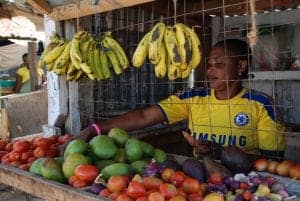Fatuma is a young widow and mother of two young children, living in the outskirts of Dar es Salaam in Tanzania. Women’s World Banking’s team met Fatuma in 2013 when we were conducting research among low-income women in the area to help our partner financial institution, National Microfinance Bank (NMB) give them access to credit with a bank.
Since her husband died two years prior, Fatuma has become the sole breadwinner of her family, running a small store where she sells bananas, tomatoes, mangoes, cooking oil, onions, even small fish. She started by renting a tiny space from someone in town, and slowly was able to save enough of her profit to buy the materials to build her own space in a central location near the main road and across from the ‘matatu’ (minibus) stop, ensuring a constant stream of business. When she finished it, she felt so happy. It also inspired her to reach higher: “If I’ve got someone to support me, who will give me enough capital, I’ll be able to run my business and build a house.” Unfortunately, she is all too aware of the barriers she faces. When she spoke with a loan officer about a loan, she said, “he sees that you earn so low so you won’t be able to return it. He says, ‘I won’t be able to give you money because you earn low.”
Fatuma is a prime example of the millions of low-income women globally who, if given the chance through financial inclusion, can do so much more. “As you see me, I like to develop. The problem is I don’t have the access.” Women’s World Banking continues to work with NMB to ensure that women like Fatuma DO get the access to, in her words, develop, and build a better life for herself and her family.




